Related Research Articles

Miles Dewey Davis III was an American jazz trumpeter, bandleader, and composer. He is among the most influential and acclaimed figures in the history of jazz and 20th-century music. Davis adopted a variety of musical directions in a roughly five-decade career that kept him at the forefront of many major stylistic developments in jazz.
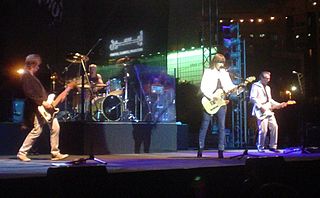
The Pretenders are a British-American rock band formed in March 1978. The original band consisted of founder and main songwriter Chrissie Hynde, James Honeyman-Scott, Pete Farndon and Martin Chambers. Following the deaths of Honeyman-Scott in 1982 and Farndon in 1983, the band experienced numerous personnel changes; Hynde has been the band's only consistent member.

Blood, Sweat & Tears is an American jazz rock music group founded in New York City in 1967, noted for a combination of brass with rock instrumentation. BS&T has gone through numerous iterations with varying personnel and has encompassed a wide range of musical styles. Their sound has merged rock, pop and R&B/soul music with big band jazz.

Ian Ernest Gilmore Evans was a Canadian–American jazz pianist, arranger, composer and bandleader. He is widely recognized as one of the greatest orchestrators in jazz, playing an important role in the development of cool jazz, modal jazz, free jazz, and jazz fusion. He is best known for his acclaimed collaborations with Miles Davis.
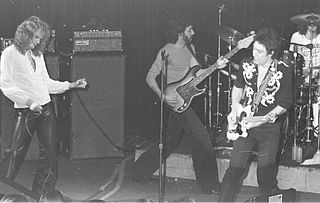
Prism is a Canadian rock band formed in Vancouver in 1977. They were originally active from 1977 to 1984 and have been active again from 1987 to present. Their classic line-up consisted of lead singer Ron Tabak, guitarist Lindsay Mitchell, keyboardist John Hall, bassist Allen Harlow and drummer Rocket Norton.

Miles Ahead is an album by Miles Davis that was released in October 1957 by Columbia Records. It was Davis' first collaboration with arranger Gil Evans following the Birth of the Cool sessions. Along with their subsequent collaborations Porgy and Bess (1959) and Sketches of Spain (1960), Miles Ahead is one of the most famous recordings of Third Stream, a fusion of jazz, European classical, and world musics. Davis played flugelhorn throughout.
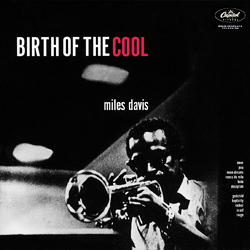
Birth of the Cool is a compilation album by the American jazz trumpeter and bandleader Miles Davis, released in February 1957 by Capitol Records. It compiles eleven tracks recorded by Davis's nonet for the label over the course of three sessions during 1949 and 1950.
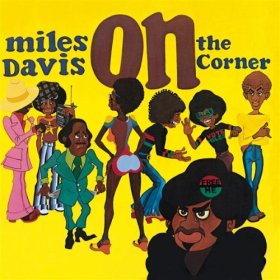
On the Corner is a studio album by the American jazz trumpeter, bandleader, and composer Miles Davis. It was recorded in June and July 1972 and released on October 11 of that year by Columbia Records. The album continued Davis' exploration of jazz fusion, and explicitly drew on the influence of funk musicians Sly Stone and James Brown, the experimental music of Karlheinz Stockhausen, the free jazz of Ornette Coleman, and the work of collaborator Paul Buckmaster.

Mike Stern is an American jazz guitarist. After playing with Blood, Sweat & Tears, he worked with drummer Billy Cobham, then with trumpeter Miles Davis from 1981 to 1983 and again in 1985. He then began a solo career, releasing more than a dozen albums.

The Man with the Horn is an album released by Miles Davis in 1981. It was Davis's first new studio album since 1972’s On the Corner, his first recordings of any kind since 1975 and his first activity following a six-year retirement. The album title references his 1952 10-inch LP Young Man with a Horn.

The Electric Flag was an American blues/rock/soul band from Chicago, led by guitarist Mike Bloomfield, keyboardist Barry Goldberg and drummer Buddy Miles, and featuring other musicians such as vocalist Nick Gravenites and bassist Harvey Brooks. Bloomfield formed the Electric Flag in 1967, following his stint with the Butterfield Blues Band. The band reached its peak with the 1968 release, A Long Time Comin', a fusion of rock, jazz, and R&B styles that charted well in the Billboard Pop Albums chart. Their initial recording was a soundtrack for The Trip, a movie about an LSD experience by Peter Fonda, written by Jack Nicholson and directed by Roger Corman.

Harvey Brooks is an American bass guitarist.
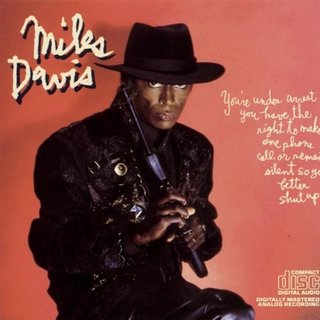
You're Under Arrest is a 1985 album recorded by Miles Davis, presenting a mixture of pop covers, and original material dealing with politics, racism, pollution and war. It is the first Davis album since On the Corner in 1972 to include electric guitarist John McLaughlin.
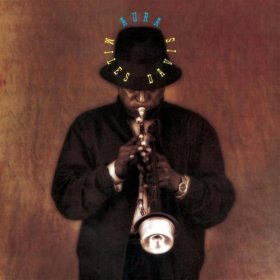
Aura is a concept album by Miles Davis, produced by Danish composer/trumpeter Palle Mikkelborg, released in 1989. All compositions and arrangements are by Mikkelborg, who created the suite in tribute when Davis received the Léonie Sonning Music Prize in December 1984, the year Decoy was released. This was Miles Davis's final album released in his lifetime.

We Want Miles is a double album recorded by jazz trumpeter Miles Davis in 1981, produced by Teo Macero and released by Columbia Records in 1982. The album combines recordings from the first live appearances by Davis in more than five years, at Boston's Kix Club, on June 27, 1981. Other tracks were recorded at Avery Fisher Hall, New York City, on July 5, and a specially prepared stage at Nishi-Shinjuku in Tokyo, Japan, October 4 of that year.

Africa/Brass is a studio album by the jazz saxophonist and composer John Coltrane. It was released on September 1, 1961 through Impulse! Records. Coltrane's working quartet is augmented by a larger ensemble that brings the total to twenty-one musicians. Its big band sound, with the unusual instrumentation of French horns and euphonium, presented music very different from anything that had been associated with Coltrane to date. While critics originally gave it poor ratings, more recent jazz commentators have described it as "amazing" and as a "key work in understanding the path that John Coltrane's music took in its final phases." It is Coltrane's first release for Impulse!.
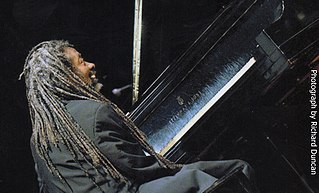
Robert Irving III is an American pianist, composer, arranger and music educator.

Emory Lee Gordy Jr. is an American musician, songwriter and music producer. A former member of Emmylou Harris' backing band The Hot Band, he is best known for his association with country singer Patty Loveless, to whom he has been married since 1989. Gordy has produced and played bass guitar on nearly all of her albums, in addition to producing albums by Steve Earle, George Jones, and Alabama.

Rubberband is a Miles Davis album, recorded in 1985 and released on Rhino Records and Warner Records on September 6, 2019. The album has received mixed to positive reviews.
While the French horn is primarily used in classical music pieces, in the mid-20th century it broke into the jazz world. While the instrument remains relatively rare, the role of the French horn in jazz has developed from its beginnings in the 1940s through to the 2010s. Note that the expression "horns" in jazz is often used colloquially to refer to all wind instruments used in jazz
References
- 1 2 3 4 5 6 7 Kellman, Andy. "Artist Biography". AllMusic . Retrieved September 12, 2020.
- 1 2 3 4 5 6 7 8 "Miles's Associates: Randy Hall". The Last Miles. Retrieved March 29, 2011.
- 1 2 3 Cole, George (2007). The Last Miles: The Music of Miles Davis, 1980-1991. University of Michigan Press. pp. 45, 71, 72, 208, 216. ISBN 9780472032600.
- ↑ "Randy Hall Top Songs / Chart Singles Discography". Music VF. Retrieved February 8, 2020.
- ↑ Hellingh, Andreas. "Randy Hall - Biography and Discography". The Soul of Amsterdam. Archived from the original on January 3, 2006.